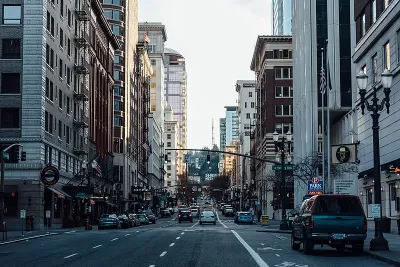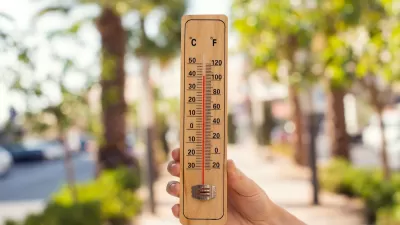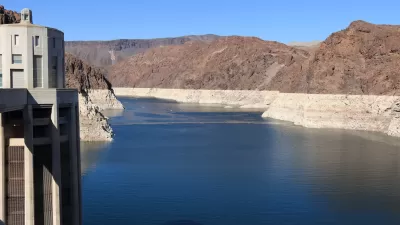The recent heat wave in the Pacific Northwest highlighted how historical inequities still affect the health and well-being of low-income and marginalized communities.

On the heels of the extreme heat waves that enveloped much of the Pacific Northwest this month, Yessenia Funes calls attention to the relationship between historic redlining and vulnerability to extreme temperatures, arguing that "the legacy of segregation across the U.S. exposes some neighborhoods more to this dangerous heat than others." Redlining, which for decades prevented Black families and other people of color from accessing home loans in affordable areas, continues to shape urban neighborhoods today. "The effects from this racist practice still linger—specifically (but not exclusively) through heat disparities."
"We don’t all experience heat the same," Funes writes. "There are unhoused people who are left exposed to the elements. There are incarcerated people stuck in hot cells who can’t advocate for themselves. And there are entire neighborhoods that grow hotter than others when temperatures rise." A study published in Climate "found that formerly redlined communities see, on average, a temperature increase of 4.7 degrees Fahrenheit (2.6 degrees Celsius) above non-redlined neighborhoods," due in part to tree canopy inequity and urban design choices. "Large roadways and buildings made of asphalt and concrete trap and emit heat," making parks and green spaces an important contributor to public health and a healthy environment. "[A]dd on top of that longer and stronger heat waves brought on by climate change, so it’s kind of a double whammy for a compounding inequity that is brought on by a global phenomenon amplifying a local phenomenon," says Jeremy Hoffman, the main author of the study and chief scientist at the Science Museum of Virginia.
Additionally, "[t]he people in neighborhoods who experience higher temperatures are often the same people suffering from food deserts, diabetes, asthma, air pollution, and housing vulnerability." And while local activists are working to create more green spaces and fight inequities in housing and public health, these organizations "really need the partnership of decision makers to enact policies that are in response to the ideas that we have." As climate change creates more dangerous weather conditions and extreme heat waves, the ability to stay cool must be addressed as a public health issue.
FULL STORY: ‘Patterns of Discrimination’: How Redlining Fueled the Heat Wave

Maui's Vacation Rental Debate Turns Ugly
Verbal attacks, misinformation campaigns and fistfights plague a high-stakes debate to convert thousands of vacation rentals into long-term housing.

Planetizen Federal Action Tracker
A weekly monitor of how Trump’s orders and actions are impacting planners and planning in America.

Chicago’s Ghost Rails
Just beneath the surface of the modern city lie the remnants of its expansive early 20th-century streetcar system.

Bend, Oregon Zoning Reforms Prioritize Small-Scale Housing
The city altered its zoning code to allow multi-family housing and eliminated parking mandates citywide.

Amtrak Cutting Jobs, Funding to High-Speed Rail
The agency plans to cut 10 percent of its workforce and has confirmed it will not fund new high-speed rail projects.

LA Denies Basic Services to Unhoused Residents
The city has repeatedly failed to respond to requests for trash pickup at encampment sites, and eliminated a program that provided mobile showers and toilets.
Urban Design for Planners 1: Software Tools
This six-course series explores essential urban design concepts using open source software and equips planners with the tools they need to participate fully in the urban design process.
Planning for Universal Design
Learn the tools for implementing Universal Design in planning regulations.
planning NEXT
Appalachian Highlands Housing Partners
Mpact (founded as Rail~Volution)
City of Camden Redevelopment Agency
City of Astoria
City of Portland
City of Laramie





























